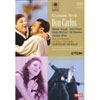Verdi Don Carlos
Verdi’s music gets respect but visually this ‘complete’ Carlos is incomplete…
View record and artist detailsRecord and Artist Details
Composer or Director: Giuseppe Verdi
Genre:
DVD
Label: TDK
Magazine Review Date: 1/2008
Media Format: Digital Versatile Disc
Media Runtime: 247
Mastering:
Stereo
Catalogue Number: DVWW-OPCARLOS

Tracks:
| Composition | Artist Credit |
|---|---|
| Don Carlos |
Giuseppe Verdi, Composer
Alastair Miles, Philippe II, Bass Benedikt Kobel, Comte de Lerme, Tenor Bertrand De Billy, Conductor Bo Skovhus, Rodrigue, Baritone Cornelia Salje, Thibault, Soprano Cosmin Ifrim, Herald, Tenor Dan Paul Dumitrescu, Monk, Bass Giuseppe Verdi, Composer Iano Tamar, Elisabeth de Valois, Soprano Inna Los, Voice from Heaven, Soprano Nadja Michael, Eboli, Mezzo soprano Ramón Vargas, Don Carlos, Tenor Simon Yang, Grand Inquisitor, Bass Vienna State Opera Chorus Vienna State Opera Orchestra |
Author: po'connor
Half-way through the Auto-da-fe scene in Act 3 of this, the most “complete” Don Carlos ever staged, a section of the Vienna audience erupts in a spate of booing. It’s not difficult to sympathise – the scene has been staged in and around the corridors of the Staatsoper, as if it were a modern political rally. King Philip and Elisabeth de Valois are surrounded by security guards wearing dark glasses. A television announcer relays the scene via a video monitor to a screen onstage, and the unfortunate penitents are dragged in chains through the theatre while being bludgeoned by policemen with batons. Eventually the principals get back to their positions via the orchestra stalls, and the story is allowed to proceed.
Peter Konwitschny’s production is a mish-mash of director’s-theatre cliches. The action all takes place within a white cube, with many low doors. Half the cast are in modern dress, others in stylised 16th-century costume. Rodrigo becomes a myopic fanatic, making notes all the time in a pocket-book. At the beginning of Act 4 Philip is found in bed with Eboli, and he sings “Elle ne m’aime pas” directly at her. The monk – supposedly the Emperor Charles V – is a sad gardener, wearing a straw hat and carrying a watering can. While Iano Tamar as Elisabeth sings “Toi qui sus le neant”, he cradles her in his arms. At the end of the Insurrection scene in Act 4, one of the Grand Inquisitor’s henchmen stabs Eboli to death.
Of course, there are dramatic moments when the singers take over and defy the “concept”, just letting Verdi’s music make its full impact. In particular, the great duet between Carlos and Philip, after Rodrigo’s death, is superbly done by Ramon Vargas and Alastair Miles (this is the melody later used by Verdi for the “Lacrymosa” in the Requiem). Although Bo Skovhus does not really possess an authentic Verdian baritone, he certainly builds up an interesting character study, his hair drawn back in a ponytail, staring at everyone through thick spectacles (Nadja Michael as Eboli knocks them off his nose during the trio).
Then there is the ballet, staged as “Eboli’s Dream”. She and Don Carlos are living in suburban bliss, and have Philip and Elisabeth round for a pizza, delivered by Rodrigo. Musically, the performance, apart from the Auto-da-fe scene, has a lot going for it under the direction of Bertrand de Billy. Visually, it is a travesty, enough to make one despair. Maybe one day someone will have the courage to stage an authentic French-language Don Carlos, including the ballet. This is certainly not it. See it if you must, but be prepared to wince.
Peter Konwitschny’s production is a mish-mash of director’s-theatre cliches. The action all takes place within a white cube, with many low doors. Half the cast are in modern dress, others in stylised 16th-century costume. Rodrigo becomes a myopic fanatic, making notes all the time in a pocket-book. At the beginning of Act 4 Philip is found in bed with Eboli, and he sings “Elle ne m’aime pas” directly at her. The monk – supposedly the Emperor Charles V – is a sad gardener, wearing a straw hat and carrying a watering can. While Iano Tamar as Elisabeth sings “Toi qui sus le neant”, he cradles her in his arms. At the end of the Insurrection scene in Act 4, one of the Grand Inquisitor’s henchmen stabs Eboli to death.
Of course, there are dramatic moments when the singers take over and defy the “concept”, just letting Verdi’s music make its full impact. In particular, the great duet between Carlos and Philip, after Rodrigo’s death, is superbly done by Ramon Vargas and Alastair Miles (this is the melody later used by Verdi for the “Lacrymosa” in the Requiem). Although Bo Skovhus does not really possess an authentic Verdian baritone, he certainly builds up an interesting character study, his hair drawn back in a ponytail, staring at everyone through thick spectacles (Nadja Michael as Eboli knocks them off his nose during the trio).
Then there is the ballet, staged as “Eboli’s Dream”. She and Don Carlos are living in suburban bliss, and have Philip and Elisabeth round for a pizza, delivered by Rodrigo. Musically, the performance, apart from the Auto-da-fe scene, has a lot going for it under the direction of Bertrand de Billy. Visually, it is a travesty, enough to make one despair. Maybe one day someone will have the courage to stage an authentic French-language Don Carlos, including the ballet. This is certainly not it. See it if you must, but be prepared to wince.
Discover the world's largest classical music catalogue with Presto Music.

Gramophone Digital Club
- Digital Edition
- Digital Archive
- Reviews Database
- Full website access
From £8.75 / month
Subscribe
Gramophone Full Club
- Print Edition
- Digital Edition
- Digital Archive
- Reviews Database
- Full website access
From £11.00 / month
Subscribe
If you are a library, university or other organisation that would be interested in an institutional subscription to Gramophone please click here for further information.




